
Android to Apple How To Transfer Photos From Google Pixel 8 to iPad Easily | Dr.fone

Android to Apple: How To Transfer Photos From Google Pixel 8 to iPad Easily
If you are an Android user and have recently switched to an iPad, you might be wondering how to transfer photos from Google Pixel 8 to iPad. It is a common question that many people ask when they switch from one device to another. Fortunately, there are several ways to transfer photos from Google Pixel 8 to iPad easily. In this article, we will show you how to do it using different methods.
We are living in a world where capturing memories is at our fingertips, and the need to share photos across different devices is more prevalent than ever. Whether you’re looking to share your photos with friends or ensure a secure backup, transferring photos from your Android to your iPad shouldn’t be a hassle.
This article is your ultimate guide to executing photo transfer with no problems. We’ll walk you through the process of how to transfer photos from Google Pixel 8 to iPad as well as iPhone, highlight common mistakes to avoid, and make sure your cherished moments are transferred seamlessly.
Part 1. How Can I Transfer Photos From Google Pixel 8 to iPad Directly?
For a straightforward photo transfer from Google Pixel 8 to iPad, Apple’s Move to iOS app can be an excellent choice. It’s important to note, though, that your iPad must be in setup mode for this method to work. If it’s not in setup mode, you’ll need to perform a reset on your iPad before proceeding with the transfer.
How can I transfer photos from Google Pixel 8 to iPad? Follow the steps below.
Step 1: Set Up Your iPad.
As you set up your iPad, reach the “Apps & Data” screen and select “Move Data from Android.”
Step 2: Install and launch Move to iOS on your Google Pixel 8.
Install Move to iOS and open the app on your Android. Review the terms and conditions and press “Agree” to proceed.
Step 3: Enter the code.
A six to ten-digit code will be displayed on your iPad screen. Enter this code when prompted on your Google Pixel 8.
Step 4: Select photos to transfer.
In the Move to iOS app, choose “Photos” to transfer your images. Then, tap “Continue” to initiate the transfer process. Remember to keep your devices close to each other and connected to power until the transfer process is completed for quicker transfer.
Step 5: Transfer complete.
Allow the app to complete the transfer process. Once the transfer is complete, you will be prompted to finish setting up your iPad. Follow the instructions to complete the setup process.
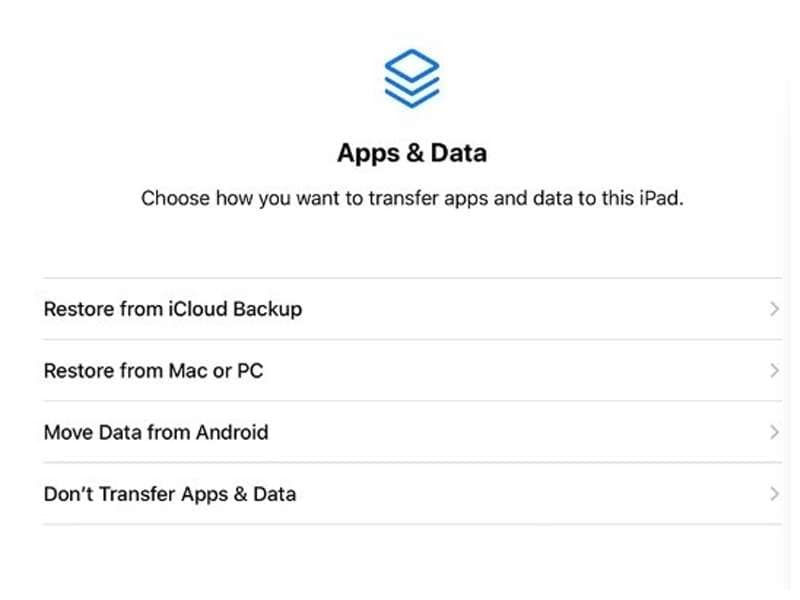
Part 2. How to Transfer Photos from Google Pixel 8 to iPad Using Cloud Services (Google Drive)
In addition to dedicated apps like Move to iOS, you can also use cloud-based storage services such as Google Drive to transfer photos from Google Pixel 8 to iPad.
Because it’s stored in the cloud, you can find your photos from any device as long as there is an internet connection. Just upload your photos to Google Drive and later download them on your iPad. It’s also suitable for backup purposes. Google provides its users a 15 GB of free storage.
How to transfer photos from Google Pixel 8 to iPad with Google Drive:
Step 1: Upload photos to Google Drive.
Open Google Drive on your Google Pixel 8, navigate to the “+” icon, and select “Upload.” Choose the photos you want to transfer and upload them to your Google Drive.
Step 2: Access Google Drive on iPad.
On your iPad, download and install Google Drive if you haven’t. Log in with the same Google account used on your Google Pixel 8.
Step 3: Download Photos to iPad.
Locate the uploaded photos in Google Drive on your iPad. Tap on each photo or select multiple photos, then click download to save them directly to your iPad.
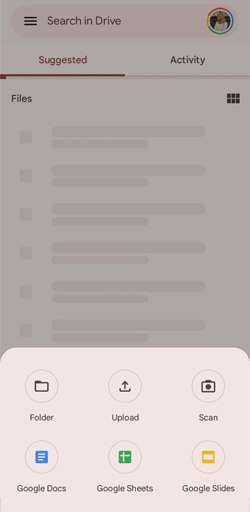
Part 3. How to Share Pics From iPhone to Android with Dr.Fone
In addition to transferring photos from Google Pixel 8 to iPad, you might also be interested in sharing pictures from iPhone to Android. Although both iPad and iPhone belong to the same Apple ecosystem, they function on slightly distinct operating systems— iPads utilize iPadOS, whereas iPhones operate on iOS.
For an efficient transfer of pictures from iPhone to Android, Wondershare Dr.Fone comes into play. This versatile tool features a dedicated Phone Transfer tool that enables comprehensive sharing of photos and other media content.
This method is particularly well-suited for streamlined bulk photo transfers, making it an ideal choice for individuals seeking a more encompassing solution for data transfer.
Dr.Fone Basic
Backup & Restore iOS Data Turns Flexible.
- One-click to back up the whole iOS device to your computer.
- Preview and selectively restore files to any device with simplicity.
- Export what you want from the backup to your computer.
- Your device’s data remains intact during the restore process.
- Supports iPhone, iPad, iPod touch, and the latest iOS version.
4,781,237 people have downloaded it
How to share pics from iPhone to Android with Dr.Fone Phone Transfer tool:
Step 1: Open Dr.Fone’s Phone Transfer tool
Make a connection between your iPhone and your Google Pixel 8 on your computer. Launch Wondershare Dr.Fone on your computer and navigate to Toolbox > Phone Transfer.

Step 2: Specify the source and destination devices
After connecting them, the platform will identify the connected devices and load their data. Choose iPhone as the source and Android as the destination device to set the transfer path. Use the Flip button to alter the transfer direction.
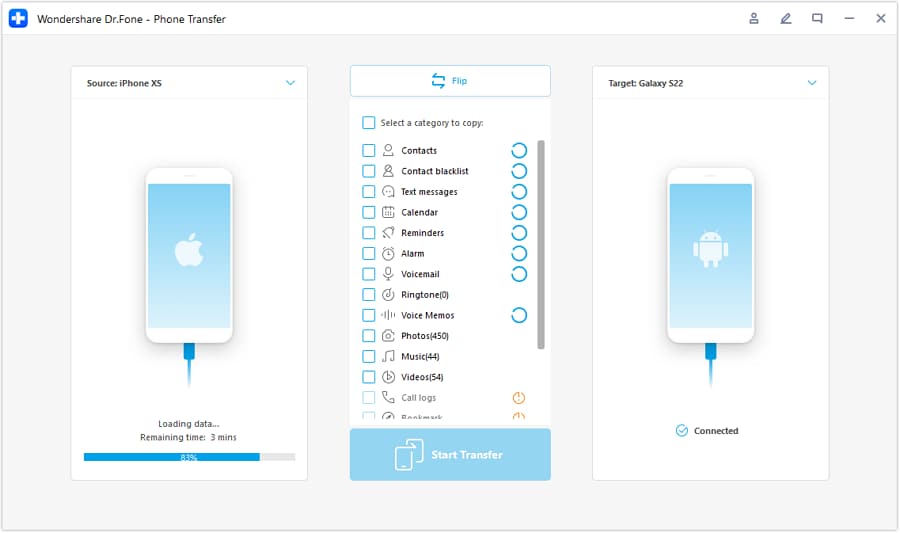
Step 3: Choose photos for the transfer
Proceed to select the types of data you wish to transfer. Checkmark photos and click the Start Transfer button. If you want to remove existing data from the destination device, you can select “Clear data before copy.”
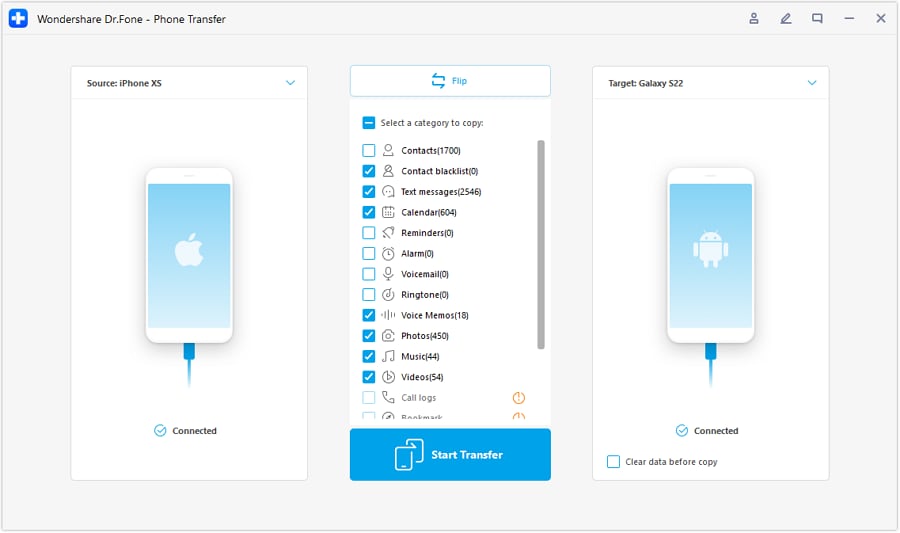
Step 4: Disable iCloud syncing
Now, Dr. Fone’s Phone Transfer tool should prompt you to disable iCloud syncing. Follow the instructions.
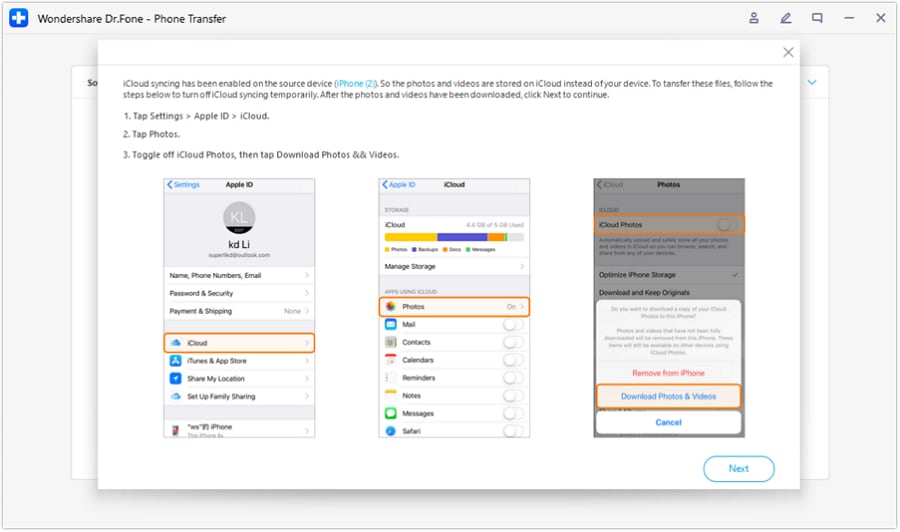
Step 5: Monitor data transfer progress
The progress of the data transfer will be displayed in a pop-up window. Once completed, click OK to conclude the process.
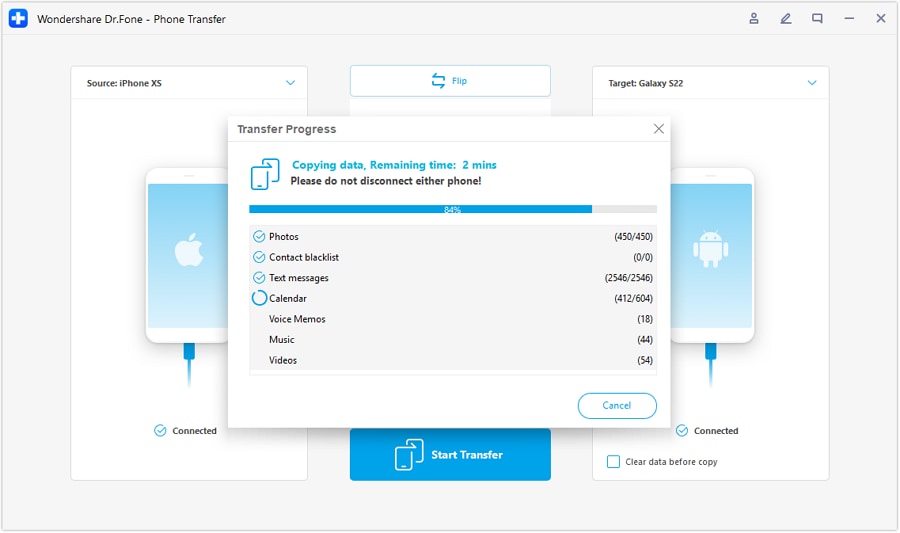
Part 4. Mistakes to Avoid When Transferring Photos from Google Pixel 8 to iPad/iPhone
Transferring photos from your Google Pixel 8 to an iPad or iPhone holds the promise of seamless photo sharing. However, several factors can contribute to the failure of file transfer processes. To address them, it’s essential to navigate through common mistakes that users often encounter so you won’t make the same errors.
1. Insufficient battery levels
Users often attempt photo transfers with low battery levels on either device. For a successful process, it is crucial to make sure that both your Android and iPad/iPhone have sufficient battery levels or are connected to power sources during the transfer.
2. Limited storage space
Overlooking available storage space on the iPad/iPhone is a common oversight. To avoid transfer failures, check and clear sufficient space on your iPad/iPhone to accommodate the photos you intend to transfer.
3. Interference from Third-Party Apps:
Allowing interference from other apps during the transfer. Close unnecessary apps on both devices to prevent potential conflicts and ensure a smoother transfer process.
4. Ignoring file compatibility:
Apple and Android devices often have varying file compatibilities. For example, iPhones commonly employ the HEIC format, which may pose recognition challenges on Android devices. So, verify that the photo formats are compatible with both Android and iOS devices. If necessary, convert files to ensure a trouble-free transfer.
5. Skipping App Permissions:
When you use apps to transfer files, they usually ask for permission to access your media files. While it’s common for users to overlook this step or hesitate to do it, not granting access can actually lead to transfer failures. The app needs permission to access and transfer files securely.
Conclusion
Although they work in different operating systems, transferring photos between Android and Apple devices, including iPad and iPhone, can be accomplished through various methods. Apps like Move to iOS and Dr.Fone provide straightforward solutions, while cloud services like Google Drive offer convenient alternatives.
[Easiest Guide] How to Clone Google Pixel 8 Phone? 6 Ways In 2024
Changing Android phones is no longer a tedious job. By using an Android clone app, you can simply transfer your data from one device to another. In this way, you can clone Android phone without the need to maintain multiple accounts Android. In this post, we will teach you how to clone Android phone using five different solutions. So what are you waiting for? Read this guide and clone Android phone without much trouble.
You can watch the video below to clone Android phone and copy its data
Part 1: How to clone Android phone using Dr.Fone - Phone Transfer?
To clone an Android phone in a fast and secure manner, simply take the assistance of Dr.Fone - Phone Transfer . It is a part of the Dr.Fone toolkit and can be used to transfer all sorts of data directly from one device to another. For instance, you can transfer your photos, videos, music, messages, contacts, notes, and multiple accounts to Android detail as well. It is compatible with all the leading Android devices manufactured by brands like Samsung, HTC, Lenovo, Huawei, LG, Motorola, and more. Having an intuitive process, it will let you Android clone in no time. To learn how to clone Android phone using Dr.Fone Switch, follow these steps:
Dr.Fone - Phone Transfer
Transfer Photo from Google Pixel 8 to iPhone in 1 Click Directly!
- Cross-platform data shift between any device of your choice from Android and iPhone.
- Support massive data, including images, videos, music, messages, contacts, apps, and more.
- Works perfectly with almost mobile phones and tablets, such as iPhones, iPad, Samsung, Huawei, etc.
- Fully work with mobile system iOS 17 and Android 13 and computer system Windows 11 and Mac 12.
- 100% safe and risk-free, backup & restore data as the original.
3981454 people have downloaded it
1. Download Dr.Fone - Phone Transfer on your Windows or Mac before changing Android phones. Afterward, you can connect both devices to the computer and launch the Dr.Fone toolbox.
2. Click on the “Phone Transfer” button to view its dedicated interface.

3. As you can see, Dr.Fone will automatically detect your connected devices. One of them would be marked as the source, while the other one would be the target device.
4. If you wish to change their positions before you do Android clone, click the “Flip” button.
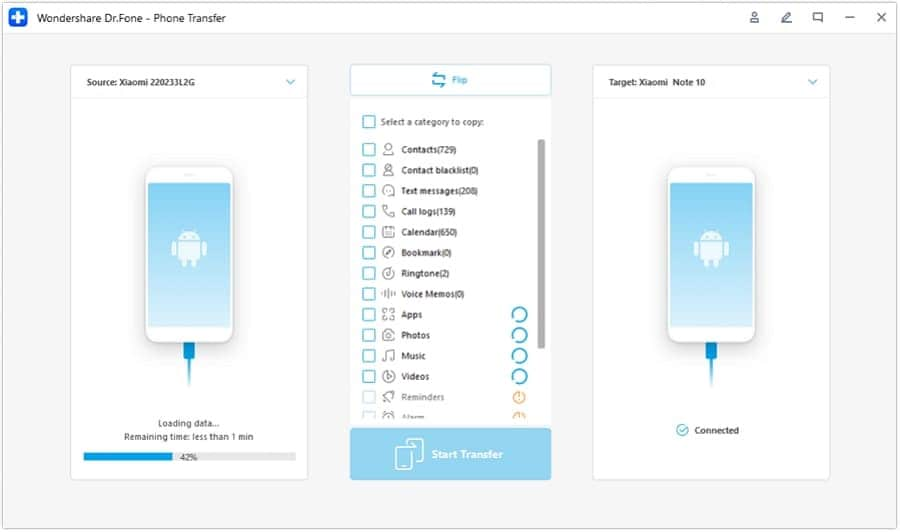
5. Now, you can select the kind of data that you wish to transfer from one device to another.
6. Click on the “Start Transfer” button to clone Android phone.
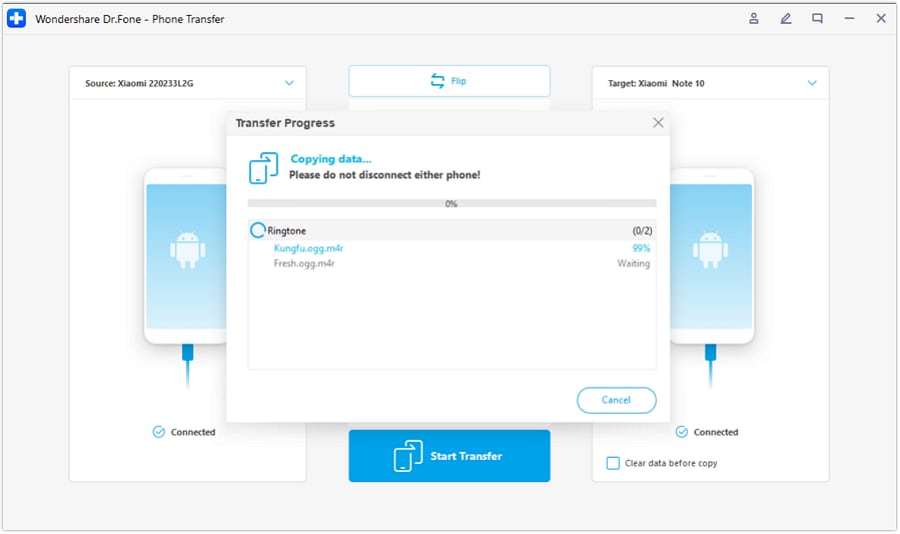
7. Sit back and wait for a while as the application will transfer the selected content from one device to another. Make sure that both devices stay connected to the computer.
8. Once the cloning process is completed, you will be notified.
In this way, you can easily learn how to clone Android phone in a few seconds. Later, you can disconnect the Google Pixel 8 devices and use them readily. Besides Android, you can also use Dr.Fone - Phone Transfer to transfer data between different platforms as well.
Part 2: Clone Android phone using SHAREit
SHAREit is a popular cross-platform device-sharing app that over 600 million users use. The app can be used to perform a wireless transfer of data at a fast speed. This is done without utilizing your data usage or via Bluetooth. The app uses Wifi directly to clone Android phone. While changing Android phones, use SHAREit the following way:
Download SHAREit: https://play.google.com/store/apps/details?id=com.lenovo.anyshare.gps
1. First, install the SHAREit app on both Android devices. You can get it for free from the Google Play Store.
2. Now, launch the app on the source device and tap on the “Send” option.

3. This will further let you select the data files that you wish to transfer. Click on the “Next” option after selecting your content.
4. Bring the target device in close proximity to the sender and launch the app. Mark it as a receiving device.

5. This will make the phone automatically detect the sending device. Select the Wi-Fi hotspot that is associated with the sending device to form a secure connection.
6. As the connection is made, you can select the receiving device on the source phone. This will initiate the cloning of your data.

Part 3: Clone Android phone using CLONEit
While changing Android phones, users often look for alternatives. Therefore, you can also take the assistance of CLONEit to transfer your files in a batch. The app can also be used to migrate multiple accounts Android without much trouble. To learn how to clone Android phone using CLONEit, follow these steps:
1. Download the CLONEit app on both devices. After installing, launch the app on the Google Pixel 8 devices and turn on their Wifi.
Download CLONEit: https://play.google.com/store/apps/details?id=com.lenovo.anyshare.cloneit
2. Mark the source device as a “Sender” and the target devices as a “Receiver”.
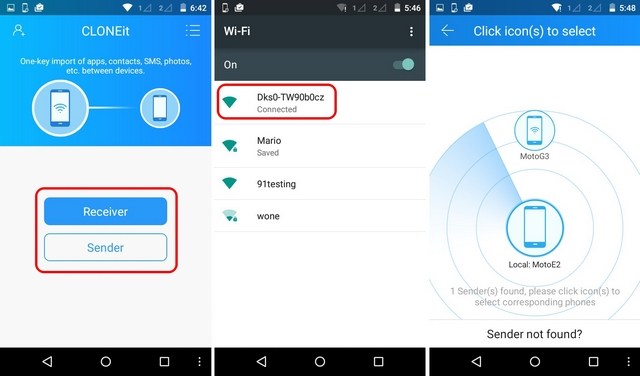
3. In this way, the target device will automatically start looking for the sender. You can view the Wifi hotspot the sender has created to verify the connection.
4. You need to confirm the connection request by tapping on the “Ok” button of the prompt.

5. Once the connection has been established, you can clone Android phone easily. Just go to the source device (sender) and select the data that you wish to transfer.
6. After making your selection, click on the “Start” button to make your target device the Android clone of your old device.
7. Wait for a while as the transfer of data would take place. You will be notified as soon as it is completed successfully.
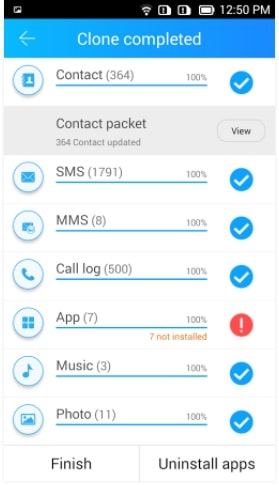
Part 4: Clone Android phone using Phone Clone
Huawei has also developed a dedicated app – Phone Clone to transfer the data from one Android device to another wirelessly. In this way, you don’t have to set up multiple accounts Android for every phone you buy. The app supports a fast and extensive cloning option with a user-friendly interface. To make your new device an Android clone, follow these steps:
1. Launch the Phone Clone app on both devices. If you don’t have the app, you can download it from Google Play.
Download Phone Clone: https://play.google.com/store/apps/details?id=com.hicloud.android.clone&hl=en
2. After launching the app on the new phone, mark it as a receiver. This will turn your phone into a Wi-Fi hotspot.
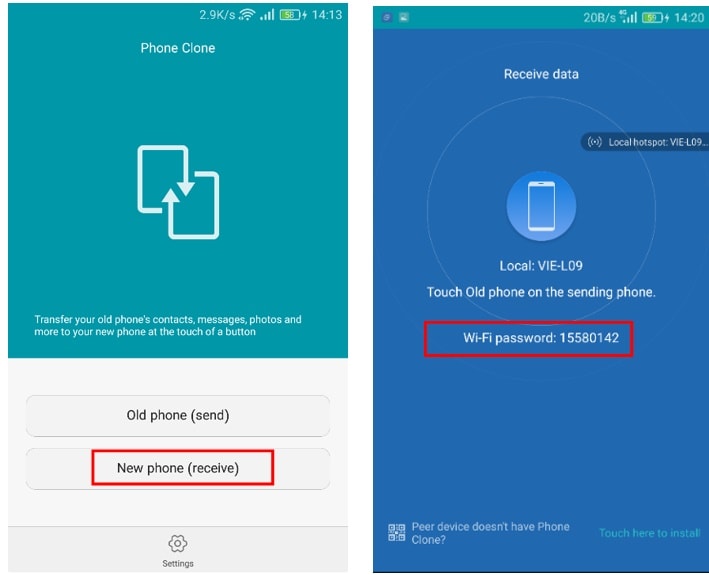
3. Go to the app on the source device and mark it as a sender. It will start looking for the available Wifi networks.
4. Connect it to the hotspot you have recently created and verified the password.

5. Once a secure connection is established, you can clone Android phone by selecting the data from the source device.
6. Tap on the “Send” button and transfer the selected content to the target device wirelessly.
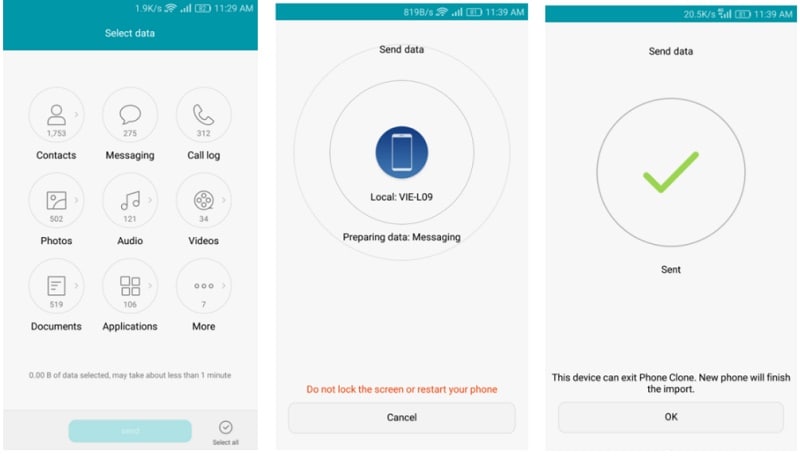
Part 5: Clone Android phone using Google Drive
Google Drive is ideally used to store data on the cloud. However, it can also be used to back up and restore your data. Even though Google Drive transfers the data wirelessly, it consumes a substantial amount of data usage. Also, the process is not as fast or smooth as other options. Nevertheless, you can learn how to clone Android phone using Google Drive by following these steps:
1. Unlock your source Android device and go to Settings > Backup & Reset. From here, you can turn on the option to backup your data.
2. Furthermore, you can verify the account on which you are taking the backup of your data and turn on the option of “Automatic Restore”. This will be of great help if you are managing multiple accounts Android.

3. After taking a complete backup of your data, turn on your brand-new Android to perform its setup.
4. Log in using the credentials of your Google Account. Make sure that the account should be linked to your previous device.

5. After signing in, the Google Pixel 8 device will automatically sync to the account and identify the backup files. Simply select the most recent backup file.
6. Also, you can select the apps and app data that you wish to transfer. Click on the “Restore” button at the end to make your target device an Android clone of your previous phone.
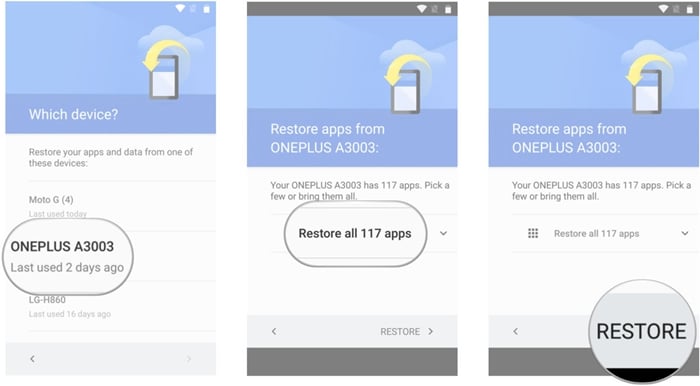
Part 6: Clone Google Pixel 8 Phone Using Bluetooth
Using Bluetooth for cloning an Android phone is not the most efficient method. It is more suitable for transferring specific files than creating a comprehensive clone. Moreover, it’s a slow and manual process that requires you to select and transfer files one by one. Here’s how you can use Bluetooth for this purpose:
1. On both Android devices, turn on Bluetooth and pair the Google Pixel 8 devices. Navigate to the file you want to send on the source device, tap “Share,” and select “Bluetooth.”
2. Now, choose the targeted device to send the file. Move to the other device and “Accept” the incoming file transfer.
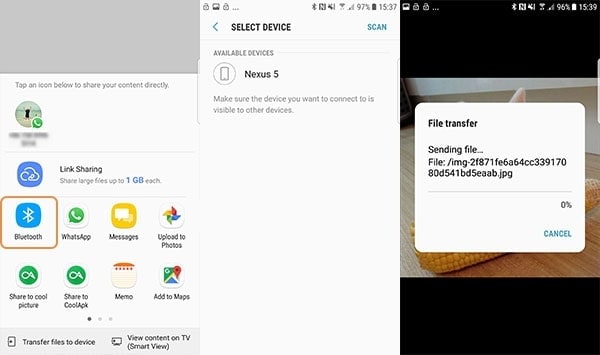
FAQs
1. Is Android phone clone safe?
Cloning an Android phone using reputable and trusted methods, apps, or tools is generally safe. Nonetheless, it is of utmost importance to exercise prudence and employ trustworthy software to safeguard your personal data. Be sure to obtain apps and tools exclusively from reputable sources, such as the Google Play Store, and adhere to the best data security practices.
2. Can I clone between different Android phone models or brands?
The ability to clone between different Android phone models or brands depends on the specific method or tool you are using. Dedicated phone transfer apps like Wondershare Dr.Fone - Phone Transfer or Phone Clone are often designed to work across various Android models and brands.
3. What should I do before cloning my Android phone to ensure a smooth process?
Before commencing the cloning procedure for your Google Pixel 8, creating a backup of your device’s data is crucial. It can be accomplished by using either the integrated backup feature or a trustworthy third-party app.
This precautionary step guarantees the safety of your data should any issues arise during the cloning procedure. Moreover, it’s imperative to verify that both devices are running the most up-to-date software updates and application versions.
Conclusion
Now, when you know six different ways to clone Android phone, you can easily move from one device to another without experiencing any data loss. This guide will certainly help every individual who is changing Android phones. Feel free to share it with your friends and family and let us know about your feedback regarding these solutions as well.
How to Transfer Data from Google Pixel 8 to Samsung Phone
Samsung is undoubtedly the most widely used smartphone manufacturer today. Cutting edge functionalities in prices that are affordable makes Samsung a favorite. Therefore, more and more users will need to transfer data to Samsung’s devices. In this article, we are going to share how to transfer data from Motorola to Samsung, especially for how to transfer contacts from Motorola to Samsung. Check them out.
If you’re going to buy a new Samsung S23, these solutions work as well.
Part 1: Transfer Data from Motorola to Samsung using Dr.Fone
Dr.Fone - Phone Transfer can be used for transferring data from to phone to another phone like messages, contacts, call logs, calendars, photos, music, video, and apps. Also, you can back up your iPhone and save the data on your PC, for example, and restore it later when you wish. Basically, all your necessary data can be transferred fast from a phone to another phone, including transfer from Motorola to Samsung.
Dr.Fone - Phone Transfer
Migrate all data from Motorola to Samsung quickly
- Easily move 11 types of data like photos, videos, calendars, contacts, messages, music, apps, etc. from Motorola to Samsung.
- You can also transfer between iOS and Android, and iOS and iOS.
- Simple clicks to operate.
- The all-in-one process to read from the source device, transfer, and write to the target device.
4,919,791 people have downloaded it
Steps to Transfer Data from Motorola to Samsung
To transfer data from your Motorola to your Samsung phone, you will require:
- USB Cables x2
- A laptop or a computer
To start transferring data from your Motorola to your Samsung phone you will need to
Step 1. Download Dr.Fone and install it on your laptop or computer.
Step 2. Using the USB cables, attach both of your phones to the computer or laptop that you just installed Dr.Fone. When you run Dr.Fone, you’ll see a screen similar to the one shown below:

Step 3. There will be several modes listed on the screen. Select the “Phone Transfer” mode. Dr.Fone - Phone Transfer will display both of your devices after detecting them.

Step 4. Notice that the menu in the center shows the items to be transferred to the destination device. If you want to transfer the contacts, check the contacts item to transfer contacts from Motorola to Samsung. Check or uncheck the boxes as per your requirement. Click “Start Transfer” when you are done. Dr.Fone - Phone Transfer will begin the transferring process. A menu will appear showing the progress of the transfer.

Step 5. You can cancel the transferring process at any time by hitting the “Cancel” button however, make sure that neither of the Google Pixel 8 devices gets detached while the transferring process is still underway.
Part 2: Transfer WhatsApp from Motorola to Samsung via WhatsApp Transfer Tool
Looking for a hassle-free way to transfer your WhatsApp data from Motorola to Samsung? If yes, your best bet to complete the transfer without a hitch is Dr.Fone - WhatsApp Transfer . This solution facilitates the smooth transfer of WhatsApp chats, ensuring all attachments are included. Not only can you transfer chats, but you can also effortlessly backup and restore your WhatsApp data,

Dr.Fone - WhatsApp Transfer
One-click to transfer WhatsApp messages from Google Pixel 8 to iPhone
- Transfer WhatsApp messages from Google Pixel 8 to iOS, Android to Android, iOS to iOS, and iOS to Android.
- Backup WhatsApp messages from iPhone or Android on your PC.
- Allow restoring any item from the backup to iOS or Android.
- Completely or selectively preview and export WhatsApp messages from iOS backup to your computer.
- Support all iPhone and Android models.
3,480,561 people have downloaded it
This versatile tool enables effortless transfer of WhatsApp and WhatsApp Business chats between smartphones. Dr. Fone stands as your ultimate answer if you seek a smooth merging of WhatsApp chats between two devices. Here is how you can transfer your WhatsApp data with ease using Wondershare Dr.Fone:
Step 1: Access Transfer WhatsApp Messages in Wondershare Dr.Fone
Begin by opening Wondershare Dr.Fone on your computer and proceed to link your Motorola and Samsung devices using a USB cable. Once the Google Pixel 8 devices are connected, navigate to “Toolbox” and there, tap “WhatsApp Transfer” to proceed. On the following screen, move to the “WhatsApp” tab and click “Transfer WhatsApp Messages.”

Step 2: Assign Correct Positions to Motorola and Samsung Devices
Now, you need to assign the Motorola and Samsung devices to their respective positions. Here, the Motorola phone should be in the “Source” position. In the same way, the Samsung device needs to be in the “Destination” position. Use the “Flip” button in case the assigned positions are incorrect.
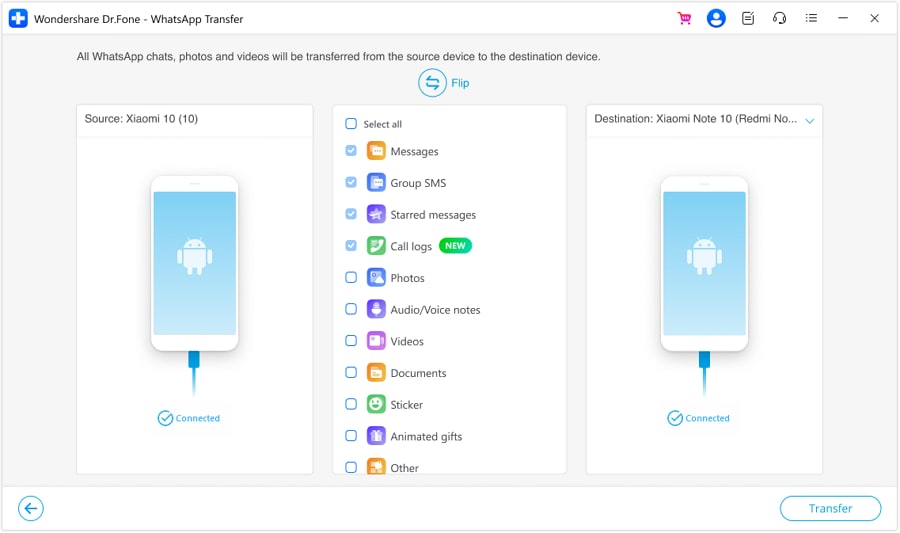
Step 3: Complete the WhatsApp Transfer Process
Afterward, click “Transfer” to commence the WhatsApp transfer process. A prompt will appear asking whether you want to back up WhatsApp data on the destination device. After making your choice, wait for the transfer process to finish, which will take only a few moments.
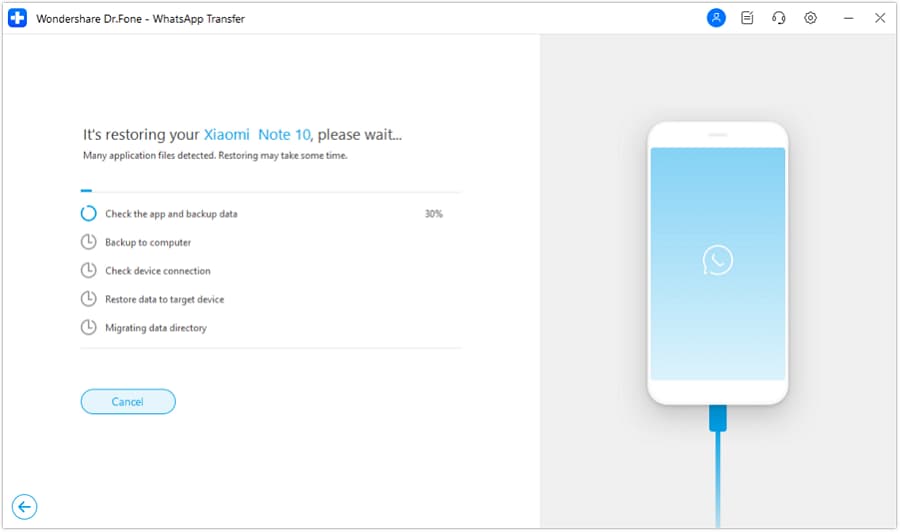
Part 3. Using Official Tools to Transfer Data from Motorola to Samsung
Samsung Smart Switch is an official tool developed by Samsung. This tool is designed to simplify transferring data from an old device, including non-Samsung devices like Motorola, to a new Samsung smartphone or tablet. This tool supports various data types, such as contacts, photos, messages, videos, calendars, and music. You can use the steps given below to transfer your data from Motorola to Samsung using Smart Switch:
Step 1. Begin with ensuring the Smart Switch app is installed on both devices. It comes pre-installed on Samsung devices, and you can download it from the Google Play Store for Motorola. Now, launch the app on both devices and keep both devices near each other.
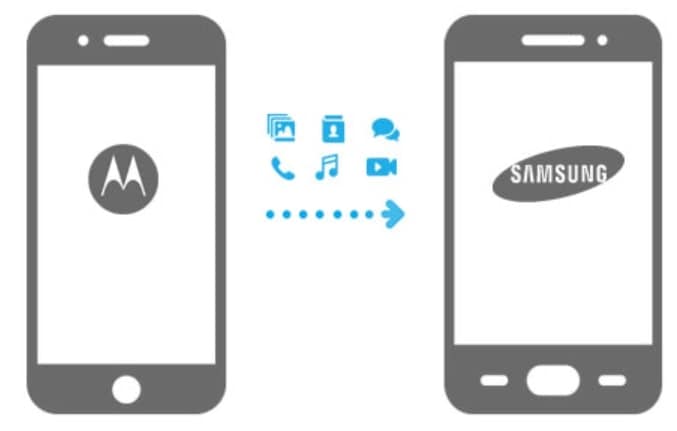
Step 2. On the Motorola device, tap “Send Data” and follow it by pressing “Wireless.” Now move to Samsung and tap “Receive Data,” then press “Galaxy/Android,” and finally tap “Wireless.”
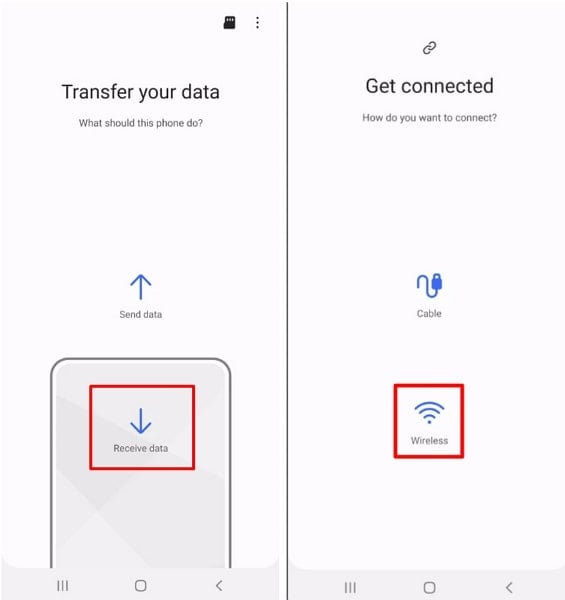
Step 3. Afterward, finalize the connection by selecting “Allow” on the old phone. Then, on your new phone, select the content you wish to transfer and proceed by tapping “Transfer.” Once the transfer finishes, tap “Go to Home Screen” on the new phone, and you’re all set to proceed.

Bonus Tip: Want to Manage Your Google Pixel 8 Data before Transferring Data?
Before initiating data transfer from your Motorola phone to your new Samsung device, it’s a great idea to declutter and organize your data. Wondershare Dr.Fone is your go-to smart solution for managing and transferring Android data. With its intuitive features, you can preview, delete, export, and manage your data. This software facilitates smooth file transfers between your Google Pixel 8 and computer.
Moreover, it enables easy transfer of media files between iTunes and Android. Dr.Fone also offers the capability to import contacts from iCloud to either your Google Pixel 8 or computer. Additionally, it allows you to view and manage mobile notifications directly on your PC. It checks how much storage is left and generates a report showing the Google Pixel 8 device’s history with basic details automatically.
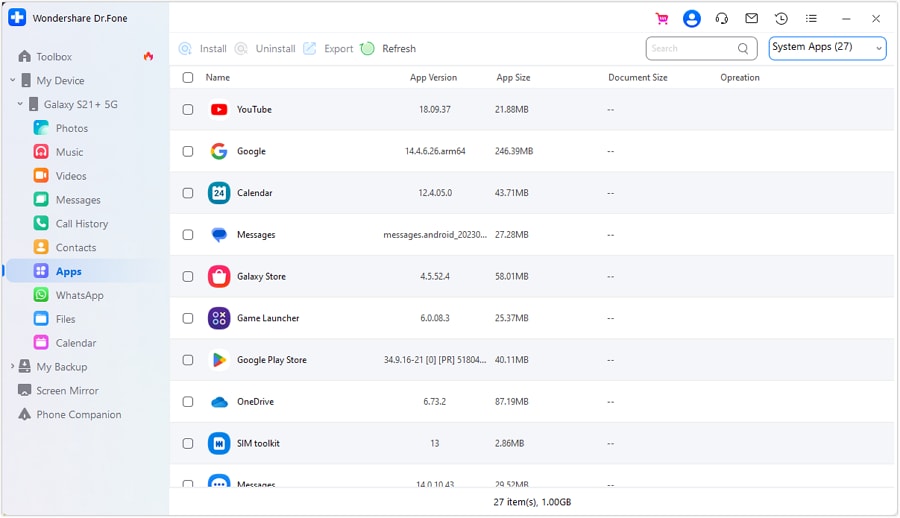
To cater for the above mentioned problems and many other, Dr.Fone - Phone Transfer was developed. Dr.Fone - Phone Transfer is an easy to use tool. It has been designed to assist you to in transferring data from your old phone to your new phone, including transferring contacts from Motorola to Samsung.
Also read:
- [Updated] In 2024, Advanced Cards for Crystal Clear Output
- [Updated] The Ultimate List of Independent Mobile Games - Play Without a Network (Android) for 2024
- 2024 Approved Architects of Online Marvel Adventures
- Best 3 Software to Transfer Files to/from Your Vivo Y78+ via a USB Cable | Dr.fone
- Comprehensive Assessment of the Syma QX10C Quadcopter: Thrilling Flight at Economical Prices
- Easiest Guide How to Clone Honor X9a Phone? | Dr.fone
- Easiest Guide How to Clone Itel A70 Phone? | Dr.fone
- Examining the Strengths and Weaknesses in Free2X Tools for 2024
- How Can You Transfer Files From Oppo A1 5G To iPhone 15/14/13? | Dr.fone
- How Can You Transfer Files From Samsung Galaxy S23 FE To iPhone 15/14/13? | Dr.fone
- How to Migrate Android Data From Poco C50 to New Android Phone? | Dr.fone
- How to Transfer Contacts from Honor 90 Lite to Other Android Devices Using Bluetooth? | Dr.fone
- How to Transfer Contacts from Honor 90 to Other Android Devices Devices? | Dr.fone
- How to Transfer Contacts from Vivo Y78 5G to Outlook | Dr.fone
- In 2024, Comprehensive Insights Streamlined iPhone Podcast Downloads
- In 2024, Explore Sound Freedom with Pazera Tools - An Up-to-Date Review
- In 2024, How To Change Motorola Moto E13 Lock Screen Clock in Seconds
- In 2024, The Ultimate Guide to Mobile Video Capture
- Undelete lost data from Vivo
- Title: Android to Apple How To Transfer Photos From Google Pixel 8 to iPad Easily | Dr.fone
- Author: Nova
- Created at : 2024-12-04 01:42:58
- Updated at : 2024-12-05 20:14:43
- Link: https://blog-min.techidaily.com/android-to-apple-how-to-transfer-photos-from-google-pixel-8-to-ipad-easily-drfone-by-drfone-transfer-from-android-transfer-from-android/
- License: This work is licensed under CC BY-NC-SA 4.0.